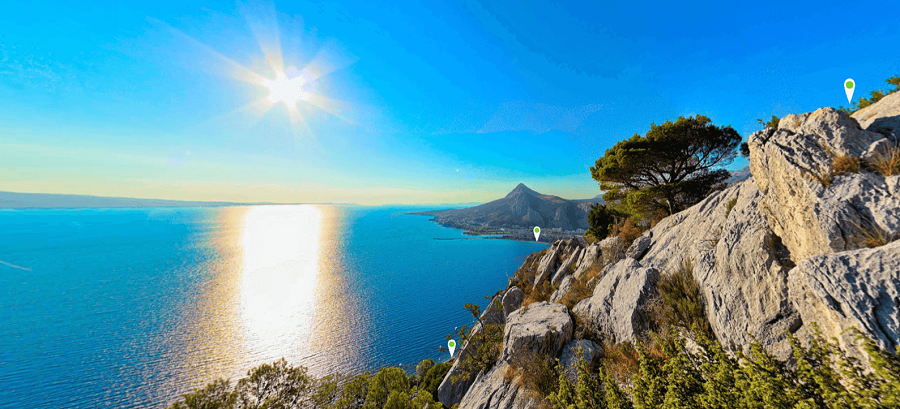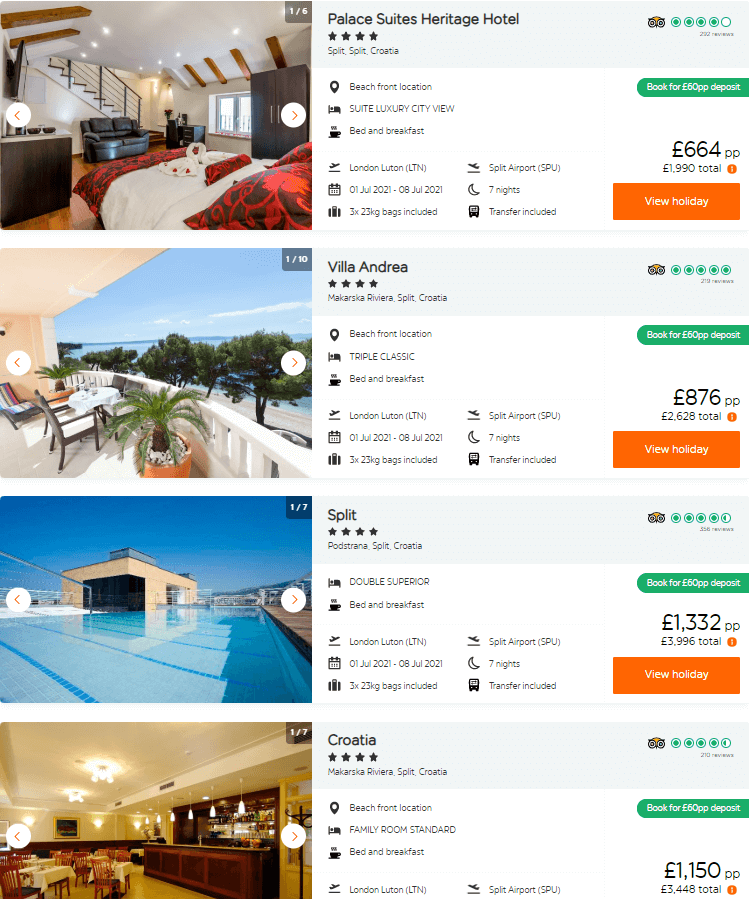HTZ Hungary Director: Croatia is Top Pick for Hungarians Wanting to Travel Abroad
May 4, 2020 - Ivana Herceg of the Croatian National Tourist Board (HTZ) Office in Hungary talks about the potential of Hungarian tourists this summer.
More than half of the Hungarian population are preparing to travel, according to a survey commissioned by the Hungarian Travel Agency, which was sent to HRTurizam by the Croatian National Tourist Board (HTZ) Representative Office in Budapest.
The survey was conducted between April 8 and 15 on a sample of more than two thousand people and asked if they planned to travel after the coronavirus pandemic, and if so, where.
Survey data revealed that after the virus disappears, 51 percent of Hungarians plan to travel within Hungary, and 12 percent of those surveyed plan to travel abroad.
When it comes to traveling abroad, the most popular destinations are Croatia and Greece, while in Hungary, Hungarians would travel an average of 227 kilometers and would like an active vacation.
Two-thirds of those surveyed currently plan to avoid organized travel after the pandemic. Also, another factor that can help Croatia, is that according to the poll, 61% of respondents will consider which countries were most affected by the virus for their future trip.
On this topic, as well as expectations for this summer season with the Hungarian market, Goran Rihelj of HRTurizam spoke with Ivana Herceg, director of the Croatian National Tourist Board Representative Office in Hungary, who points out that Croatia, in the eyes of the Hungarians, is justifiably one of the safest destinations. In these special circumstances, our advantages are even more pronounced over the competition.
The fact that Hungarians know our country well and that many of them are "permanent guests" of certain accommodation providers will surely play an important role in choosing this year's destination for their vacation, Herceg points out, adding that the Hungarian media monitors the situation in neighboring countries. "Croatia is always mentioned as a positive example and in case travel is possible we believe that a part of the Hungarian population will traditionally choose Croatia.”
According to currently available data, the situation in Hungary (2942 cases and 335 fatalities) is slightly worse than in Croatia. Asked what the current epidemiological situation in Hungary is "from the inside" and what are the announcements regarding loosening measures in Hungary, Herceg points out that Hungary is lower than the European average for the number of patients.
"Given a population more than double than in Croatia, it is expected that there will be more infected people. Hungary has tested more than 70,000 people and at the moment, the death toll is 31 per million inhabitants. This number is higher than in Croatia, and compared to the rest of the world, it is the average number of deaths. According to the Hungarian map of the number of infections, the majority are in Budapest. Still, the western and southern parts of Hungary, along the border with Croatia, are below average in terms of the number of patients. Contrary to the situation in other European countries, the measures are still in force in Hungary, even being tightened, making it mandatory to wear a mask on public transport and shops, in markets and on visits to institutions from Monday, April 27. The Prime Minister announced a new security situation on May 3, and until that date, you could only leave homes for shopping and personal needs and going to work. However, you were not allowed to leave your place of residence."
As far as travel is concerned, the entire tourism sector is eagerly awaiting new information, especially after the first signings on the so-called "Tourist corridors". It is not yet known when the borders will open and which protocol will be in place when entering another country. However, it is a European Union level travel protocol, and each country will negotiate independently with its neighbors through bilateral relations. So too is Croatia, and talks have already begun with Slovenia, the Czech Republic and other countries.
There is interest in Croatia in Hungary, both according to the above survey and according to Herceg. "In contact with partners in the tourism sector, but also in the interest of the media, we can conclude that there is an interest in Croatia, as indicated by a survey commissioned by the Hungarian Tourism Organization (MTÜ). According to the survey, 51 percent of Hungarians will travel after the pandemic within Hungary, and 12 percent of respondents will travel abroad. Among foreign destinations, Croatia was the most frequent answer, along with Greece. The results of some other studies show even greater interest in Croatian destinations, which is expected because Hungarians are incredibly fond of Croatia, which is easily accessible by car, and because a large number of Hungarians own real estate and ships in Croatia."
At the end of last year and the beginning of this year, the interest of Hungarians in Croatia increased, which is certainly a good indicator of Croatia's position in Hungary.
“At the beginning of the year, it seemed that this would be another record year for Croatian tourism. In January and February, we achieved growth from the Hungarian market, after many years Croatia and Hungary had to be connected by airline and new itineraries of the largest Hungarian tour operators were in preparation. During April and May, we planned to implement several prepared activities, which we had to cancel, which were to promote different products and different parts of Croatia. Travel agencies still mainly deal with cancellations and refunds, but according to some partners, bookings for Croatia are canceled less than in other countries."
Although it is difficult to predict, in the event this slows down and borders open in the next two months, Herceg believes that Croatia could still be the first choice of most Hungarians.
"This is supported by its proximity, possibility to travel by car, and a quick return in case of any problems, but also the fact that the Hungarians know our country well, consider it safe and feel welcome. The fact that a large number of Hungarians stay in private accommodation during their stay is also positive in this situation, compared to competing countries, which mainly offer accommodation in hotels. We also support information from individual partners who have informed us that guests are looking to change destinations and that instead of Greece, for which they have already paid, they want to swap for Croatia," Herceg concludes.
To read more about travel in Croatia, follow TCN's dedicated page.
Hvala Hrvatska: Expats Share Video Thanks for Keeping Croatia Safe
May 4, 2020 - Hvala Hrvatska, a small video gesture of thanks from expats from all over the world but living in Croatia to the Croatian authorities for their handling of the health threat of coronavirus.
A few weeks ago, a Brit in Zagreb (and occasional TCN contributor), Rowan Carstairs, sent me a very nice email thanking TCN for its corona coverage and also a suggestion on extending this thanks and that of other expats to the Croatian authorities for their excellent handling of the health threat from COVID-19.
It was an excellent idea, and I put it on my list of things to do. That expats were very grateful and felt very safe was clear from the 40+ submissions from all over the world who contributed their Croatian lockdown stories, comparing things to back home. And almost all focused on one thing that Croatia was doing much better than their home country.
Keeping people safe.
Although Rowan's idea made it on my To Do list, my list is sadly very long these days, as the many people who are waiting for things from me will tell you. Rowan obviously saw this and took the initiative to send an article to Lauren, who is, always has been and forever more shall be much more efficient than me. Rowan's article Hvala Hrvatska: Should Expats Show Thanks for Great Coronavirus Handling was published the same day was very well received.
And it spawned an initiative led by our favourite Romanian in Split, Mirela Rus, who invited expats to record themselves offering their thanks. Again, this made it onto my To Do list, but...
We, members of the expat community in Croatia, are extremely grateful for how the coronavirus crisis is being handled by our adoptive country.
We are very appreciative of everyone fighting in the front lines of this unprecedented battle, as well as of the Croatian people in general, that are always coming together in times of crisis.
We find ourselves very lucky to be living through these tough times here, where we feel safe and where we feel so much at home.
Hvala od srca, Hrvatska! ❤️
Thanks to Total Croatia News for sparking the idea, to everyone involved in the making of this video and special thanks to our friend Nick Hathaway for the amazing video editing job!
Very nice. Thanks to both Rowan and Mirela for their initiatives. And let's get this off the To Do list and say the biggest thank you at all - Hvala Hrvatska for a fantastic and very communicative handling of the crisis.
For the latest on coronavirus in Croatia, follow the dedicated TCN section.
Any Hope for Croatian Tourist Season? We're Neighbours' First Choice
Croatia has handled the coronavirus pandemic exceptionally well so far. Could this spark hope for 2020's Croatian tourist season after all?
As Poslovni Dnevnik writes on the 4th of May, 2020, the Croatian Adriatic is an extremely popular destination and is usually the first choice for holidays for most Slovenes, Hungarians and Poles, but also to the Czechs, Germans and the Austrians. Despite the complete closure of the country as a result of the coronavirus pandemic, even the Italians, which have been the hardest hit in Europe, haven't completely abandoned the idea.
Given that the epidemiological picture in Croatia is currently good, something could still happen for this year's Croatian tourist season, according to a report from Vecernji List.
"This, and the fact that Croatia can be reached by car provides benefits that could bring us some traffic in the second part of the season from Germany, since the German Government's warning about travelling abroad is in effect until June the 14. But of the three million Germans who came to visit Croatia last year, almost 1.5 million came in August and later on. If we can travel hy then, and if half of them visit like they did last year, we will save part of the Croatian tourist season,'' said the Croatian National Tourist Board's German chief, Romeo Draghicchio.
The Slovenes account for the majority of the usage of cottages and rented camping pitches in Croatia, and our neighbours to the north are certainly planning to come, but it would be naive to compare these potential figures for 2020 with the record 11 million overnight stays that were achieved last year, explained the director of the Slovenian office of the Croatian National Tourist Board, Metka Bradetic.
The situation is similar with Poland and Hungary, with those in the hospitality industry placing a lot of their hope in the hands of the nearby Austrians.
"If the borders are opened, Croatia will be the number one foreign destination for Hungarians," said Ivana Herceg, the Croatian National Tourist Board's director in Hungary.
The latest forecasts indicate that Czech tourists will first go to Austria and Slovakia, and then to Croatia and some other countries. Spain, France and Italy aren't on the list, revealed the Croatian National Tourist Board's director for the Czech Republic, Dubravko Miholic.
Croatia's ease of access by car seems to be the most important factor, along with the stability of the epidemiological picture following closely behind. This was confirmed by Kristijan Stanicic of the Croatian National Tourist Board, who, despite the coronavirus crisis is ''looking at the summer mildly optimistically'' and has been mentioning possible promotions in Croatia's close markets which are accessible by car.
Make sure to follow our travel page for more on the Croatian tourist season.
Majority of Croatian Companies No Longer Paying Fee for Croatian Forests
As Darko Bicak/Poslovni Dnevnik writes on the 3rd of May, 2020, given the fact that the COVID-19 crisis has shaken the global, and consequently Croatian society, and the economic damage that the pandemic will cause when everything is ''totalled up'' is still unknown, public calls are being made in Croatia for the abolition of a series of state, public and local institutions and fiscal and especially para-fiscal levies. Many Croatian companies are seeing an opportunity in the midst of the crisis.
While certain people think that now is the time to change the territorial structure of the country with one stroke of a proverbial brush overnight, abolish a number of chambers and agencies and to reduce, delay or ultimately abolish many fees, it's more realistically clear that this will not happen either quickly or go smoothly, and most of these things cannot simply just be abolished after having been in function, be that a good thing or a bad thing, for such a long time.
One of the most controversial para-fiscal levies is the one paid for the care of Croatian forests, which has long been being paid by business owners in Croatia. A few years ago, the new Forest Law stipulated that SMEs would no longer have to pay this fee. In particular, when the law was passed in mid-2018, of the previous 202,162 taxpayers, 181,794 of them were exempted from paying these fees.
But what is this actually all about? From Croatian Forests, they warn of the dangers that abolishing this fee entirely could have on the safety and functioning of the entire economy, as well as society. Krunoslav Jakupcic, President of the Board of Croatian Forests, pointed out that we're witnessing many wanting this fee, along with other fees paid by Croatian companies, to be abolished.
He explained that 30 percent of the funds raised through this ''forest fee'' goes to mine clearance in forested areas.
"We're sorry to see this [fee] classified as a ''para-fiscal levy'' at all, it would be more correct to say that it is one of the few fees for which its purpose of use is actually specified by law. The abolition of compensation for the generally beneficial function of Croatian forests would have unprecedented consequences for the karst forests, which are threatened by fires and the other catastrophic consequences of accelerated climate change,'' warned Jakupcic.
He specified that 37 percent of the money raised from this fee goes specifically to karst forest management (in Dalmatia, Primorje, and Istria) which don't have an economic role in terms of timber production, but play an invaluable role in terms of oxygen production, carbon sequestration, tourism, recreation and much more.
30 percent of the collected funds from this fee paid by certain Croatian companies goes to the demining actions in forested areas, and 20 percent is pumped into preparations for fighting fires during the warmer months and implementing protection in time for the the fire season. Forest owners see 12 percent of the collected funds, and a mere (and truly symbolic) 1 percent of that same money goes to the scientific research work of the Forestry Institute and the Forestry Faculty.
One issue that is often raised is the fact that 37 percent of the money raised through this ''forest fee'' goes to Croatia's karst forests that have no actual economic role.
''Past amendments to the Forestry Act have worked to offset the cost of small Croatian companies, exempting as many as 90 percent of Croatian business owners from having to pay this particular fee. Therefore, the fee is currently paid exclusively by Croatian companies with annual revenues in excess of 3 million kuna, amounting to only 0.0265 percent of total revenues.
For example, if a company has revenue of three million kuna, the annual amount of compensation is 795 kuna, while a company with revenues of 10 million kuna pays a compensation of 2650 kuna per year, in four installments,'' explained Jakupcic, adding that the funds raised through the implementation of this fee help to achieve immeasurable benefits in terms of demining and protecting forests from fires, which is of great importance for both tourism and health and encourages employment in Croatia's numerous rural, karst regions.
For more on Croatian companies, follow our business page.
Beware the Croatian Inspector: 9. Company On The Stand
May 4, 2020 - Beware the Croatian inspector - a new series courtesy of Glas Poduzetnika (Voice of Entrepreneurs), highlighting a Croatian business reality that helps kill growth, profit, and entrepreneurship. Company On The Stand.
I have seen them operating all over the country over the last 18 years, the most feared visitors to Croatia's cafes, restaurants, and other businesses - the Croatian inspector.
As with many corrupt countries, the role of the inspector should be to make sure that the rules are being adhered to in the particular area they specialize in - sanitary, fiscal, etc - but in reality, the prime motivation is to find ways to fill the State coffers and their own. Allegedly.
I heard SO many stories of inspections where perfectly run businesses end up paying thousands in fines, some of it justified, much of it grossly unfair. And there is an old truism here:
If the Croatian inspector comes to visit, he will find something, even if there is nothing there.
It is a subject that I have wanted to cover for years, but I never had quite the right material. Until now.
Huge thanks to those very proactive chaps at Glas Poduzetnika, who are really becoming a force for change to be reckoned with. A really great initiative. In one of their latest moves, they have been collecting some of their members' experiences with the Croatian inspector, to highlight the issue and the realities of doing business in Beautiful Croatia.
Story #9: Company On The Stand
Around fifty times a year, I do fieldwork, selling the goods from a stand that should be set up every morning. Tables, benches, and products go under the tent, and then I pack up everything at the end of the day. On one occasion I came to a smaller village, and as soon as I set up my tent, an inspector came asking me about the company. I hadn't put out the company name yet as I literally had just finished with the tent construction, where I hang the goods—in other words, the company name hasn't been put up as I still didn't have where to put it. At 7.30 am, in a village where considering the small number of inhabitants, the sale does not start before 9—9.30 am. Fine 4,000 kn. It was ten years ago, I wasn't fined in the meantime because I really try my best to make sure everything is according to the rules, but for fear that something like this happens again, my life got 10 years shorter.
Beware the Croatian Inspector is a new daily series (yes, there really is that much material) which you can follow here.
If you have a Croatian inspector story you would like to share with the Glas Poduzetnika team (in English or Croatian), you can do so via This email address is being protected from spambots. You need JavaScript enabled to view it. Subject TCN inspector.
You can follow the 55,000+ others on the Glas Poduzetnika Facebook page.
Tourism in the Corona Age: 10 Virtual Ways to Discover Omis
May 3, 2020 - Tourism is on hold, but most of us have plenty of time. So let's look at the virtual resources available to explore Croatia virtually. We continue our new Virtual Croatia series with the tools to discover Omis.
A few weeks ago I wrote that being a tourism blogger in the corona era was about as useful as being a cocktail barman in Saudi Arabia. I feel less useless now, a few weeks later, and I am encouraged by the number of Croatian tourism businesses who are contacting us wanting to start thinking of promoting post-corona tourism.
One of the challenges of writing about tourism at the moment is that there is nothing positive to write about. With people confined to their homes and tourism in Croatia currently not possible, many have decided to go into hibernation until it is all over.
I think that this is a mistake, and I have greatly enjoyed the TCN series by Zoran Pejovic of Paradox Hospitality on thinking ahead to tourism in a post-corona world. You can find Zoran's articles here.
Way back on March 14 - several lifetimes ago - I published an article called Tourism in the Corona Age: 10 Virtual Ways to Discover Zagreb. The way I saw things, now was an OUTSTANDING opportunity for tourism promotion. People have time, they yearn for their freedom and former lives, so give them the tools to thoroughly research and enjoy your destinations, and you will have then longing to be there. And when they do come, they will have a deeper understanding of the destination due to their research.
South Africa and Portugal were the first to do their post-corona tourism promotion videos several weeks ago (Post-Corona Tourism Planning: Lessons from South Africa and Portugal), a trick which has been followed by other tourism countries, the latest being Croatia with the national tourist board campaign, #CroatiaLongDistanceLove, going live yesterday.
But while these campaigns create longing and market presence, they don't really educate. People now have time to really get into destinations. And dreams of escape to somewhere more exotic are high on the list of priorities of many.
So TCN has decided to help with that education with a new series called Virtual Croatia, where we will be helping you discover many of Croatia's destinations with all the best virtual tools available on your self-isolating sofa at home.
We started last week with Tourism in the Corona Age: 10 Virtual Tools to Discover Hvar.
After this, we put our a press release (which you can read here in English and Croatian) offering a free article to any local tourist board in Croatia who would like the free promotion in our Virtual Croatia series.
The Sinj Tourist Board was the first to respond, and now you can see just how rich the tourism offer is in this proud Alka town - your virtual tools to Discover Sinj. This was followed by DIscover Opatija and Discover Brela.
Next up, Petra Bartulovic, Director of the Omis Tourist Board, who sent me some virtual tools to help us discover Omis, one of the most fascinating destinations on the Adriatic.
Let's begin!
Discover Omis: Small Town, Big Adventure
Omis is a small town, but one which will offer you a very big adventure.
Love Omis!
The very best of Omis. In 90 seconds!
Omis by drone.
Timelapse Omis.
Omis as It Once Was
Timeline 1990.
Timeline 1986.
The capital of UNESCO Dalmatian klapa
Omis is well known as the hometown of a capella singing and is famous for Klapa Festival that was established in 1967.
Some say that the first and the oldest konoba in Dalmatia opened in Omis in 1969 and is placed in a 400-year-old stone house. This is also the cradle of the famous Festival of Dalmatian Klapa Omis. Konoba „U naseg Marina“ was the inspiration for the very well known song in Croatia: Konobo moja (My konoba) written by Tedi Spalato and performed by Meri Cetinic.
The capital of pirates!
What to say that hasn't been already said about Omis pirates? Some approve this part of Omiš history, some don't. I like it! They were brave, cunning and bold, great sailors and shipbuilders who were taking right to their land and their sea, annoying powers ruling the Dalmatian coast at the time. People from Omis, led by the Kacic dukes, controlled the Adriatic Sea all the way from Split to Dubrovnik during the 12th and 13th century, charging a fee for safe sailing. It was actually a very good business, for the part of the sea they controlled was the route for merchant ships and Crusaders sailing to the East (Constantinople, Palestine...). Merchant powers of those times like Venice, Dubrovnik, Kotor and Split, whose ships were sailing on this route didn't like the idea of paying and I guess Omiš people weren't being very polite and civilized as most in the Middle Ages. One thing led to another and the Omis people became pirates!
The Omis Pirate Battle, which has been taking place for 13 years in a row in the Omis City Port, has grown to one of the traditional and most important cultural events of the summer season in the area of Omis, the Split-Dalmatia County as well as entire Croatia.This unique event is a re-enactment of the battle between the Omis pirates and Venetians which took place in the 13th century. Being based on historical events, the Pirate Battle contributes to the branding and promotion of Omis as the pirate town. A couple of hundred armed „pirates“ and „Venetians“, as well as members of historical honor guards „Kumpanija“ from the town of Blato on the island of Korčula, „Trombunjeri“ from the town of Dubrovnik and „Uskok“ from the town of Klis.
The capital of freedom: the Poljicka Republic.
Poljica is a historical region that covers most of the Inland Omis today, once known as the Principality of Poljica. The story of Poljica is so extensive that it asks for its own article. So, in short, the process of forming Poljica as an autonomous region began at the latest in the 13th century and lasted until the beginning of the 19th century. Poljica covers 250 km2 and consists of Upper, Middle and Lower Poljica. The statute of Poljica is one of the oldest and most significant Croatian legal documents. I have to admit, I love Poljica very much. It is hard not to love it due to its history, legends, tradition, stone houses and churches, karst and mountain landscape.
Soparnik is a yummy traditional dish from Poljica made of dough, swiss chard, onion, olive oil and garlic baked on Dalmatian open-hearth fireplace - komin, directly under hot embers and ashes and served on huge wooden board – sinija. Soparnik is protected and issued by the EU geographical origin label and declared as intangible cultural heritage of Croatia.
The statue of Mila Gojsacic was made by famous Croatian sculptor Ivan Meštrović. Mila was the heroine of Poljica, who sacrificed her own life for the freedom of Poljica in 1530. Thanks to our world-famous sculptor Ivan Meštrović, Mila is standing on the cliff above the canyon, making sure her Poljica stays safe.
An unforgettable adventure tourism destination
Zipline.
Paragliding.
Rafting.
Free climbing.
Dalmatia Ultra Trail.
Omis Half Marathon
Windsurfing.
Aqua aerobics.
Mountain biking.
Moto.
Beaches, beaches, beaches
Omis lies at the heart of the Central Dalmatian coast. Which means beaches!
A walking tour of Omis
Take a tour of the streets of Omis.
St Leopold Mandic theme trail
The St Leopold Mandic theme trail is the first theme trail open in the Omi region. It starts next to the sanctuary of St. Leopold Mandic in Zakucac. It circles on the 2.6 km long part of the canyon and thanks to the 9 educational boards visitors can get to know more about the nature and culture of this area. There are also 11 rest stops and 5 magnificent viewpoints.
Virtual tour of Omis
Get to know Omis, the 360 way.
Official Omis Tourist Board & 25 Things to Know and Dalmatian Klapa and Pirate Heaven
Discover Omis via the official Omis Tourist Board website.
To learn more about Omis, check out the TCN article Omis: 25 things to know about Dalmatian Klapa and pirate heaven.
THIS. IS. OMIS. When can we expect your visit?
To discover more of virtual Croatia, you can follow this series in our dedicated section, Virtual Croatia.
If you are a local tourist board in Croatia and would like your destination featured in this series for free, please contact us at This email address is being protected from spambots. You need JavaScript enabled to view it. Subject Virtual Croatia (and destination name)
Nikola Tesla Museum Opens for Individual Visits
ZAGREB, May 3, 2020 - The Nikola Tesla Technical Museum in Zagreb has recently announced that it will reopen to the public on Monday, 5 May, but only to a limited number of individual visits, with adherence to sanitary and social distancing measures.
The reopening of museums and galleries is in accordance with the government's decision for starting business and other activities in the conditions of the Covid-19 epidemic.
Until further notice, the museum will be open from 9 a.m. to 5 p.m. from Tuesday to Friday, and from 9 a.m. to 1 p.m. on Saturday. It will be closed on Sundays, holidays, and Mondays.
Group visits and visiting the mine inside the museum will not be possible until further notice. Lectures in the Planetarium and in Nikola Tesla's Demonstration Cabinet will not be held either.
Visitors must adhere to sanitary measures, which include disinfecting hands, maintaining the physical distance of two metres, and they are also forbidden from touching museum exhibits or other surfaces when it is not necessary.
The number of people who can be in the permanent exhibition area at the same time has been limited to no more than 45.
The museum noted that its building had not sustained major damage in the earthquake that had struck Zagreb and its environs on 22 March.
More museum news can be found in the Lifestyle section.
Culture Ministry: Media Freedom Is Foundation of Every Democracy
ZAGREB, May 3, 2020 - On the occasion of World Press Freedom Day, observed on 3 May, Croatia's culture ministry underscored the importance of freedom of media as a pillar of each democratic society which is supposed to provide conditions for unobstructed and safe work of journalists.
This year, World Press Freedom Day, is marked in specific circumstances in which we evaluate in a particular way the role of media in the society, the ministry said in a press release on Sunday.
Accurate, true and timely reporting in accordance with the media freedoms in times of crisis represents a pillar for each individual and for the whole society, the ministry said.
Without the role of independent and free media in checking the information and without trust which the general public has in the media system, one cannot imagine the prevention of dissemination of fake news and disinformation in the world full of easy to access information, the source of which is unknown, said the ministry.
Unfortunately, media outlets are hard hit by the consequences of the crisis caused by the COVID-19 pandemic, and therefore the ministry will undertake additional measures to provide support to reporters, and publishers.
The ministry recalls on its web site that on 17 March, Croatia's government adopted a series of measures to assist the cultural sector in order to minimise the adverse effects of the COVID-19 pandemic.
“We are aware that the crisis has affected all levels of society – economic as cultural, public as private, so by various measures we try to cover all segments of the cultural sector, emphasizing above all the spirit of solidarity and community as the foundation of a just and democratic society," Minister Nina Obuljen Koržinek was quoted as saying.
"The measures are intended to cover all artists and cultural workers who, in these moments of crisis which full reach is difficult to predict, lose their ability to act, and whose social and economic status is fundamentally threatened. We want to ease the devastating effects of the coronavirus pandemic, but also the recent earthquake that has additionally threatened the cultural and artistic field, one of the most vulnerable segments of the society,” said the minister.
More journalism news can be found in the Politics section.
Three Associations, GLAS Against Non-Working Sundays
ZAGREB, May 3, 2020 - The associations -- a Croatian association of agricultural producers, a national association of cafe and restaurant owners and the Voice of Entrepreneurs -- said in their joint press release that ban on Sunday trading would reduce revenues of retailers, small farmers and cafe owners.
The press release issued on Sunday recalls that those businesses have already been hit hard by the corona crisis, and ban on Sunday trading would be additional shock. They ask for regulation of the work on Sunday rather than ban.
Tihomir Jaić of the Croatian association of agricultural producers said that family farms that sell their produce on the farmers' markets would suffer from that ban on Sunday shopping.
Vedran Jakominić of the above-mentioned association of cafe and restaurant owners said that the ban on Sunday trading was an act of encroaching on the economic and human freedoms, although cafes and restaurants could be nominally open on Sundays.
He said that due to the ban on Sunday work of shopping centres, cafes and restaurants placed in those facilities would not be allowed to work, too.
The Opposition party GLAS on Sunday reiterated its position that the ban on trading on Sunday was only in the interest of the election campaigning of the ruling HDZ party led by Prime Minister Andrej Plenković, while this measure would be to the detriment of small businesses.
Small retail owners and agricultural producers cannot endure that ban now when they do business in restrictive conditions due to the epidemiological situation, sad GLAS.
The temporary ban on Sunday trading has been recommended as an epidemiological measure to curb the COVID-19 spread.
More economy news can be found in the Business section.
easyJet Holidays 2021: Clues to Croatian Tourism Challenges on Price
May 3, 2020 - Looking ahead to next year, the easyJet holidays 2021 offers are out. How is Croatia comparing on price?
One of the many great unknowns about post-corona tourism is price. What is fairly certain is that there will be less flights and less tourism in general. That will necessarily mean more competition from tourism countries for a piece of the smaller remaining pie. And of the various tools available to entice visitors at the lower end of the market, none will be more in evidence than...
Price.
Traditionally, Croatia does not do well on price comparisons with other tourism countries in the Mediterranean. That is a subject for another time, but it is clear that the days of easy tourism are over - at least for now - and if Croatia is to compete in the general tourism market, it is going to have to reassess its strategies on price.
A reader sent me an email today with some offers for easyJet holiday 2021, which he subscribed to. My heart missed a beat when I looked at the first one until I saw the date of the offer.
A family of three from the UK for a week to a 5-star resort on the water in Turkey, all-inclusive including price, for £895 total, or £299 per person. With a deposit of just £60 per person.
To repeat - return flights, transfers, 7 nights in a 5-star hotel on the water, with all food included. For less than £300 a person.
I checked the date and remembered to breathe - April 22 - 29, 2021. Very much shoulder season.
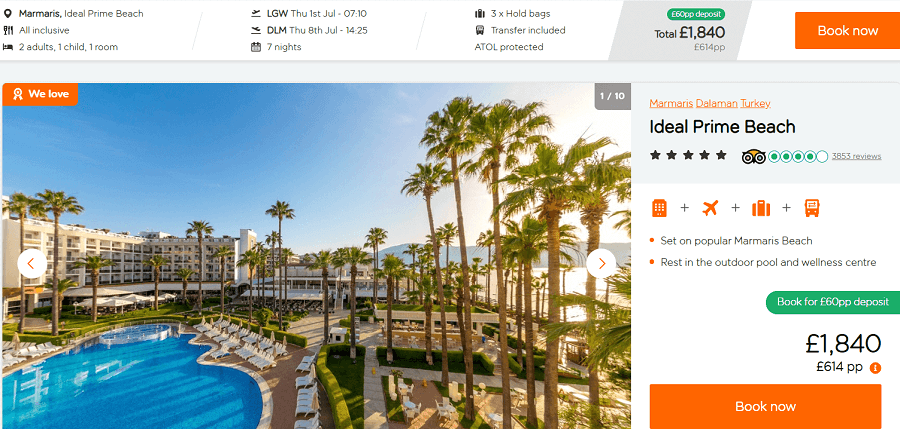
So how did the price compare in peak season? I chose the week of July 1 - 8, 2021. More than double the price at £614 per person, but still a pretty good deal for peak season holiday in a 5-star hotel with all food taken care of, as well as flights and transfers.
I have never looked at easyJet for anything but flights before, so I decided to explore the easyJet holidays 2021 offer to see how Croatia was comparing with its early pricing for next year.
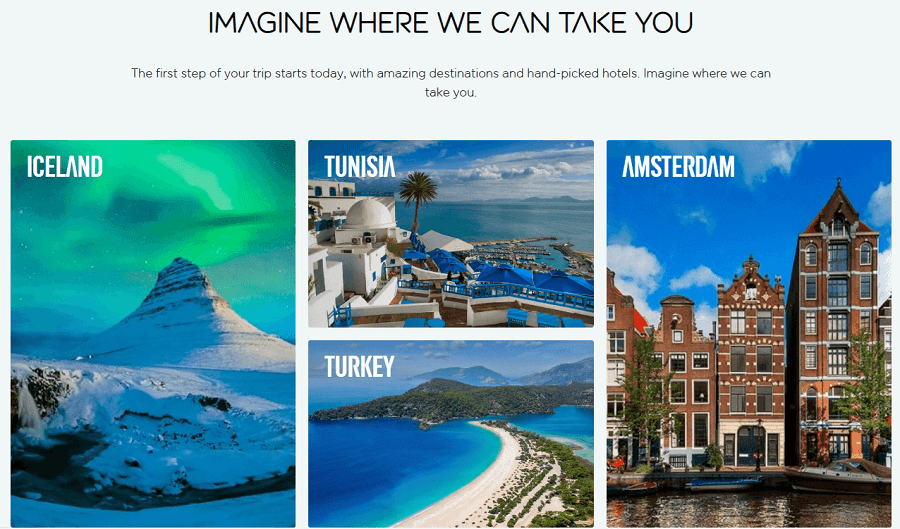
easyJet is a significant player in the Croatian market, carrying more than 600,000 passengers last year.
Not enough to make the enticing homepage advert imagining where easyJet could be taking you in 2021 - that was reserved for Iceland, Amsterdam, Tunisia and Turkey.
So how does Croatia compare on price for those same dates - July 1 - 8, 2020? I went to the Croatia section and chose the Split region. The competition from Turkey, remember, was a 5-star resort, all-inclusive with flights and transfers - for £614 per person for a family of three.
The Split region's cheapest option only offered bed and breakfast, not all-inclusive, was 4-star not 5, and was £50 more expensive.
The fourth-cheapest option was on the Makarska Riviera, was also one star lower in quality with only breakfast on offer. And was almost twice the price of £1,150.
In order to standardise the research, I decided to go for one type of holiday, all-inclusive of everything - flights, transfers, hotel and meals, and to see the two cheapest countries for several competing countries, as well as Croatia. Here is what I found (same dates - July 1-8, 2021).
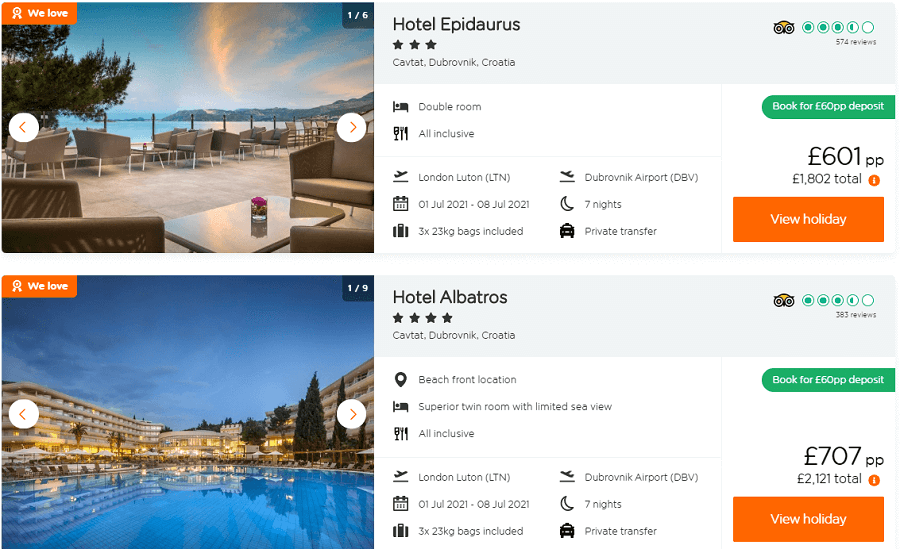
Croatia the cheapest all-inclusive was cheaper than my 5-star Turkish example above, at £601, but was only 3-star. The next cheapest was considerably more expensive, and only 4-star.
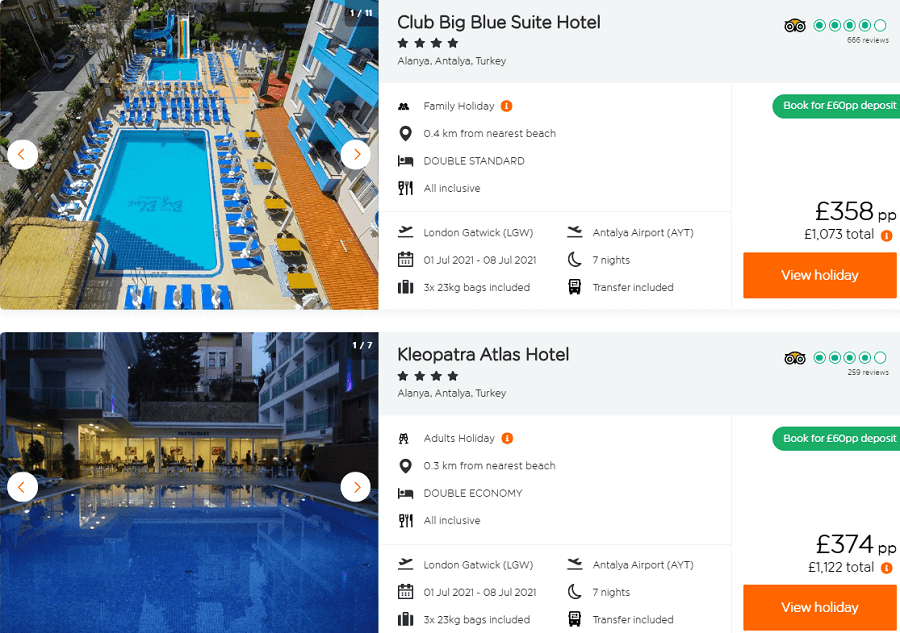
And if you are prepared to slum it in a 4-star hotel, you can do it at half the price in Turkey. Yes that's right, a peak season July 1-8, 2021 holiday in a 4-star Turkish hotel with flight, transfer and all food, for just £358 per person.
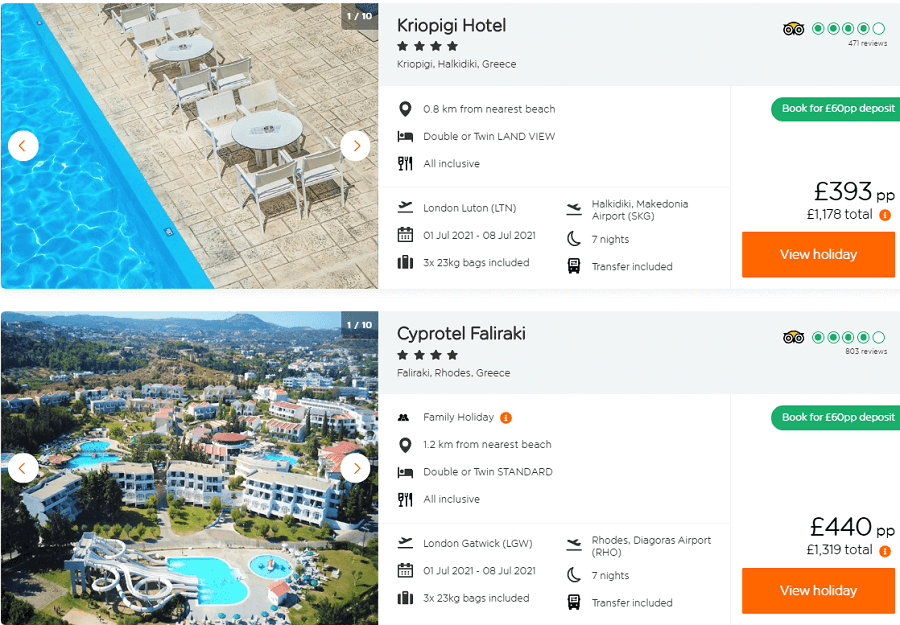
Meanwhile in Greece, the 4-star all-inclusive deals are a little more expensive than Turkey, but a lot cheaper than Croatia.
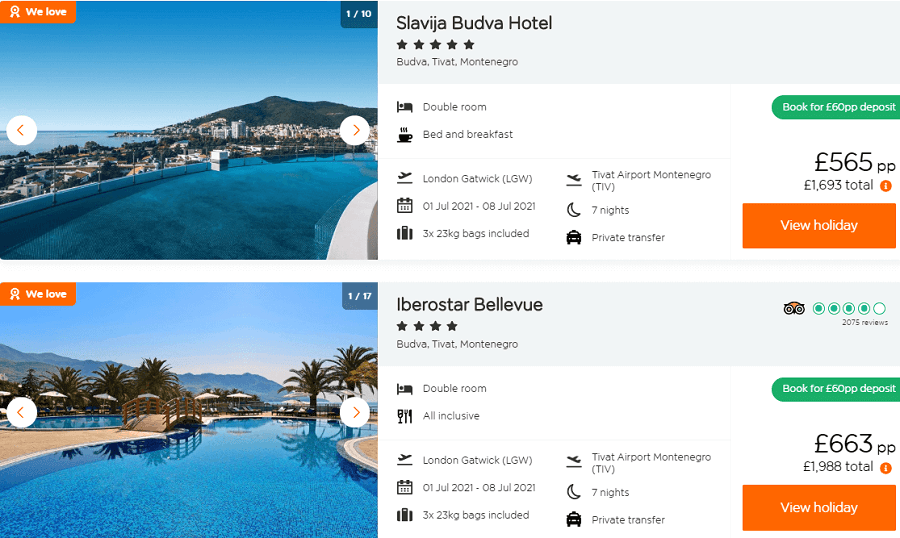
And in neighbouring Budva, easyJet holidays 2021 had jsut two offers, but you can get 5-star bed and breakfast in Budva for £565, or 4-star all-inclusive in Tivat for £663.
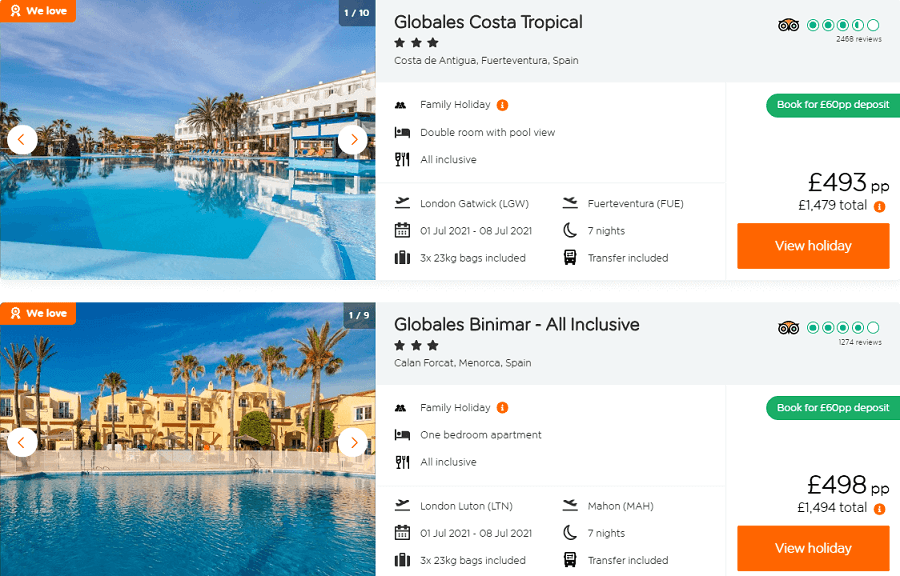
Over in Spain, the 3-star all-inclusives can be had for under £500.
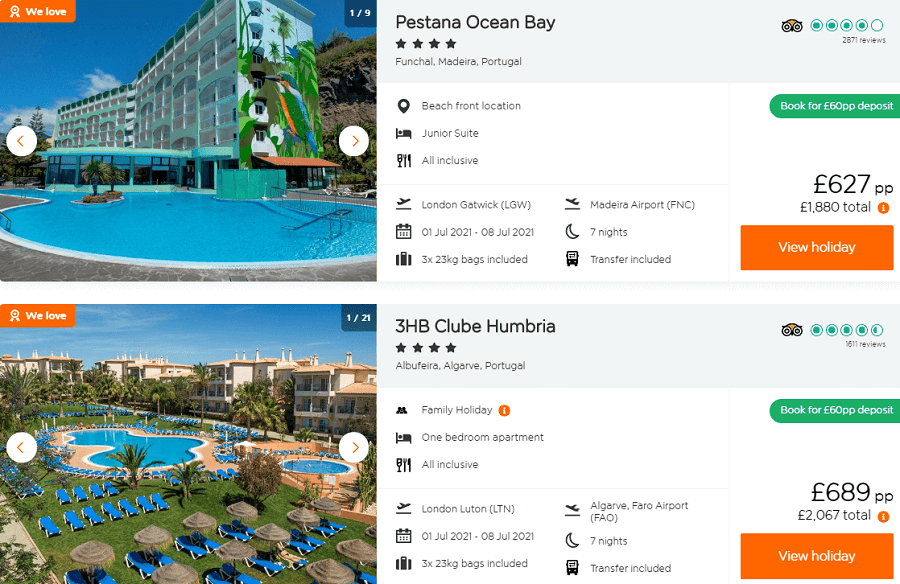
And in Portugal, the 4-star offers are the cheapest on sale, and cheaper than the Croatian equivalent.
Not surprisingly, for those who follow Croatian tourism closely, the most expensive offer in this admittedly limited random sample came from Croatia.
Is that a problem? At this point no, as there are so many things and factors which could change everything again several times between now and next summer.
But it is something that tourism planners and businesses at the cheaper end of the market need to be keenly aware of if they want to keep some semblance of market share. The tourism business has changed, and the competition in the future will be fierce.
You can do your own easyJet holidays 2021 research on the official website.
For more on tourism in Croatia, follow the TCN travel section.

